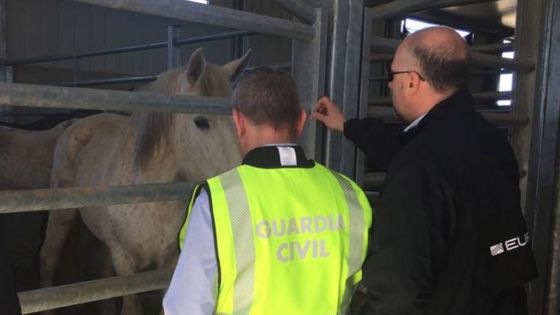
A Spanish-led police operation has cracked a racket in horsemeat unfit for human consumption, the EU`s police agency Europol says.
Police in Spain made 65 arrests for crimes including animal abuse, forgery, money laundering and racketeering.
Horses in Portugal and Spain deemed unfit for consumption were slaughtered and their meat passed off as edible.
A Dutch businessman arrested in Belgium is said to have controlled the illegal trade from south-west Spain.
He was first sought in connection with a scandal in the Republic of Ireland in 2013, when horsemeat was found in beef burgers, but his whereabouts were unknown at that time.
The issue in theearlier scandal was one of food fraud rather than food safety.
How big was the police swoop?
Spain`s Guardia Civil (police) began Operation Gazel a year ago after detecting unusual behaviour in horsemeat markets.
They worked in co-ordination with Belgium, France, Italy, Portugal, Romania, Switzerland and the UK, Europol said in a statement.
The unnamed Dutchman controlled the crime ring from Calpe in Alicante, on Spain`s Costa Blanca, "putting his most trusted men in charge in every country affected by the scam", Europol says.
Police carried out raids in both Alicante and Leon, in the north of Spain, blocking or seizing bank accounts and properties, and confiscating five luxury cars.
Other charges brought against those arrested were perverting the course of justice and committing crimes against public health.
How did the racket work?
Horses in bad shape, too old or simply labelled as "not suitable for consumption" were being slaughtered in two different slaughterhouses, Europol says.
Meat from the animals, which came from Portugal and several parts of northern Spain, was processed in a specific facility and from there sent to Belgium, a major horsemeat exporter.
Microchips and documentation were modified by the crime group.
Analysis of samples conducted in The Hague concluded the meat was destined mainly for markets outside Spain, as the samples matched others found abroad.
How were horses maltreated?
One of the charges brought is animal abuse but details are not yet available.
However, a photo released by Europol shows one horse with a bloody slash close to its mane.
How big is Europe`s horsemeat market?
Italy and France are the biggest consumers of equidae (horses, donkeys etc) meat, according to a report by the UK`s Guardian newspaper in 2013.
According to that report, Italy imported 21,693 tonnes and France 11,898 in 2012, while Belgium was the chief exporter, shipping 17,320 tonnes. Spain exported 3,910 tonnes in that period.
However, the trade is small compared, for instance, to the beef market.
Total EU horsemeat imports in 2012 came to 50,250 tonnes and exports 54,853, while EU beef imports in 2011 totalled 315,000 tonnes and exports - 510,200.


0 comments:
Post a Comment